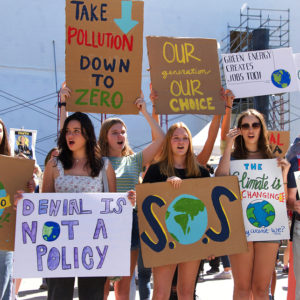President Biden in a very few days has revealed that his climate change plan is based on an apocalypse being on the horizon. Plans that are based on worst-case assumptions are almost always flawed, always lead to blowback, and always lead to the waste of scarce resources. This is not a case for climate change denial, but it is a call for a clear and hard-headed look at the facts.
The predictions of catastrophic temperature increases are based on complex climate models. But we know that these models have almost uniformly overstated past temperature increases. For example, the climate bandwagon got a big boost from Dr. James Hansen who predicted in 1988 that by 1997, global temperatures would increase by 0.45 degrees C. In fact, they increased by 0.11 C—one fourth of his prediction. Over the years, there have been similar predictions that turned out to be false. Former Vice President Al Gore predicted in 2008 that the Arctic would be ice-free by 2013.
In 2017, Professor John Christy in congressional testimony showed how model predictions are overstating actual temperature increases. This should not be surprising, since the climate system is very complex and models have to use many assumptions in addressing climate uncertainties.
Predictions of dread derive mainly from estimates of climate sensitivity—the temperature increase associated with a doubling of CO2. But the International Panel on Climate Change can only provide an estimate of sensitivity—1.5C to 4.5C. Others have estimates with a wider range. Climate advocates always use a larger sensitivity number because it leads to the greatest damage estimates. But no one can show with a high degree of certainty the probabilities associated with the IPCC or other ranges.
Advocates assert it is necessary to plan for the worst to keep it from happening. Few question this sophomoric sound bite. If it is was true, believers would never fly in a plane or ride in a car because the worse case would be a fatal crash. Last year, MIT Professor Robert Pindyck published an insightful paper, “What We Know and Don’t Know About Climate Change, And Implications for Policy.” He documents the implications of uncertainty while making the point that the correct policy response is not to do nothing but that the cost of actions that represent insurance “is likely to be large.”
President Biden’s approach and rhetoric suggest he is going to solve the climate problem. He is not, and as Hoover Institute economist Thomas Sowell has observed, there are no solutions, only trade-offs. Our economy and response to climate change will benefit by taking a close look at the trade-offs and pursuing options that reduce costs without significantly increasing risk. For example, instead of continuing to subsidize wind and solar which are not suited for baseload power generation, support for more nuclear, continued use of natural gas, and more research into carbon capture is likely to be superior. Letting technology determine the future of oil and gas is preferable to actions like killing the Keystone Pipeline and banning exploration and production on federal lands. Oil is a global commodity, so what we don’t produce will be produced elsewhere with the cost being jobs lost here.
Our policy should also be informed by the reality that CO2 emissions are global and without real global actions the effectiveness of our policy will be diminished. China, India, and Russia emit 2.5 times more CO2 than we do, so real actions by them would have a large payoff. Our investments in technology have made us leaders in reducing carbon intensity and improving energy efficiency. We can use our knowledge to help bring about greater global gains by helping developing nations adopt proven energy technologies. The trade-off between doing that combined with continued technological progress should be compared to the Biden crisis approach.
Climate policy driven by zealotry that leads people like special climate envoy John Kerry to claim that the upcoming COP-26 “is the last best chance the world has to come together in order … to avoid the worst consequences of the climate crisis” does not contribute to sound policy.

